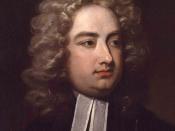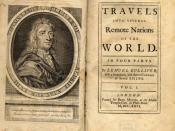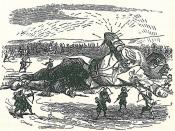Irish writer Jonathan Swift developed a great gift for writing remarkable satires
and allegories. Swift used his experiences and put them into satires, a work of literature
in which human folly is attacked through irony, disrespect, and wit. "Most of his satire
was based on political and religious corruption surrounding him" (Context 1). Swift's
goal was to let people know what was going on behind closed doors in politics and in
religion. Amazingly these satires changed society. He did not state the obvious, but
worked around it so that these allusions seemed true. Most of his writing was dedicated
to the struggle for Irish independence against English supremacy. Ireland always had
problems with the English. Whatever the problem was, Swift was there to defend his
country as well as he could in his satires, especially in "A Modest Proposal." He also
used allegories such as Gulliver's Travels to demonstrates his abstract ideas and
principles against the English government.
Swift was a learned man, educated at the best schools. His education gave him
the strength to succeed as a prominent writer. In 1688, after graduating from Trinity
College in Dublin, Ireland, Swift was requested to be a secretary for Sir William Temple
who was located in Surrey, England. English critic Norman Jeffares asserted that,
"During this time an anti-Catholic Revolution provoked reaction in Ireland" (23). This
made Swift's decision very simple; he needed to get out of Ireland so he took the job
offer. Shortly after his work began, Temple and Swift became very close. With his job
as a secretary for a man of religion he soon turned to the church for forgiveness of his
sins. In 1695 Swift was ordained dean in the Anglican Church. Some time passed and
trouble stirred up with Queen Anne and the Catholic Church.



A lot of sources!
i like your essay in overall, but you are using way too many sources which makes the essay strong but doesn't reveal what you as an author really did, except finding information and linking them together!
2 out of 2 people found this comment useful.